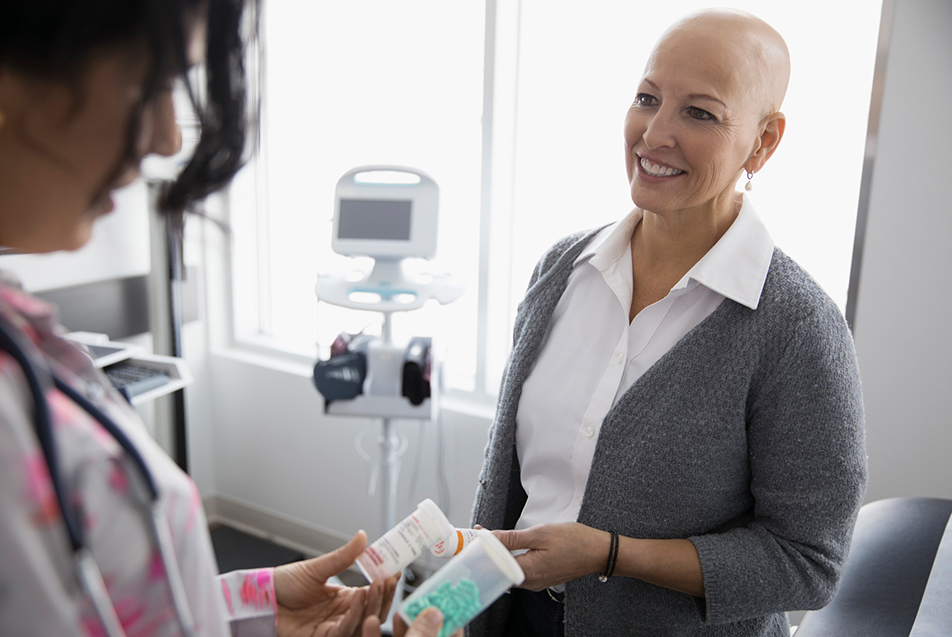
When we committed to the new Parkview Cancer Institute (PCI), part of the vision was to provide innovative approaches to patient care. Part of that approach is facilitating cutting-edge clinical research opportunities. We invited Emily Powell, PhD, research clinical operations manager, to explain how Parkview is helping to move the needle for progressive cancer treatment.
The initiative
The Parkview Research department currently has more than 100 active clinical trials, across all different forms of cancer, and 11 currently dedicated to breast cancer. Different studies ask different scientific questions. These might be about the effects of a drug or surgical procedure or an aspect of recovery.
Who it’s for
There could be several scenarios when a clinical trial is appropriate. For example, standard-of-care chemotherapy works for some patients but not for others. For patients who wish to pursue additional treatment options, the physician might offer the opportunity to participate in a research study. Or a surgeon might mention an opportunity to a patient if he or she needs a biopsy in a particular area, and a trial is currently underway to assess recovery after using a less-invasive procedure.
How research studies work
A team of researchers, which includes physicians, research nurses, clinical research coordinators, regulatory coordinators, billing compliance specialists, data specialists, and others, works with PCI to help manage ongoing trials and coordinate the care of patents on those research studies. Most of the studies at the PCI are aimed at testing new drugs or new combinations of existing drugs. In other instances, a research study begins with an idea. In these cases, a physician will form a hypothesis and, after considering patient volume and populations, they might develop what’s known as an “investigator initiated study”.
The research team and physicians work together to provide details to the patient and make sure they fully understand the risks and side effects. If the patient wants to enroll, he or she provides informed consent and then, sometimes after a few more tests of their tumor and blood markers, they’re enrolled.
The Parkview team collaborates with any sponsors of the study to provide data and imaging scans to help determine whether the new drug is working, or to prove or disprove the scientific hypothesis. These results might reveal the rate at which a tumor grows, or a patient’s white blood cell count over time.
It’s extremely important for the research team to provide an unbiased view of trial. We make sure we don’t persuade or dissuade people. We give them facts, list the risks and let them make an informed decision. Our role here is to offer a possibility for those who wish to participate.
The benefits
Historically, if a patient had a cancer that was difficult to treat or their condition was not responding to therapy, they would have to travel to a large academic institution, often to obtain access to these types of research studies. The goal of the research team and Dr. Sharma’s team at PCI is to offer those cutting edge research trials, and newest and best care, here at home in our immediate community, so they don’t have to travel far away.
In many cases, the benefit of participating in a research study might not fall directly to the patient participating. It might impact the future patient. In the rare cases where risks are involved, the patient is monitored closely and taken off of the treatment if the care team notices any ill effects; this in itself is an important finding because it could spare future patients from the same ill effects. If the treatment works, that’s how we get new therapies that become the standard of care. The motivation to help future patients is often the reason that patients elect to participate in clinical research, even if the odds of directly benefitting from the study are low.
Is it safe?
There are certainly risks, but clinical trials are carefully designed. Before a drug even gets to the point where it’s ready to start testing, for example, it’s gone through rigorous testing. If any potential side effects are indicated before the official trial, patients would be closely monitored for those symptoms. We would never go into a trial completely blind. Many studies have already gone through Phase 1 testing, which means they were done at other institutions and some data already exists.
It’s important to know that there are established human protections surrounding these trials to ensure the process is ethical and not putting patients at risk. The Institutional Review Board (IRB) reviews proposals and has a lot of oversight in the process.
The cost
Once IRB paperwork is in place, the study is ready to start, in theory. But research can be expensive! Our team works to coordinate funds through pharmaceutical companies or grants. Part of our role is to make sure everything is covered appropriately and that there is a steady stream of revenue to support the trials. We have a team of billing compliance specialists who are well-versed in what insurance might cover and what they won’t and what we need to cover as an institution or bill to Medicare and Medicaid.
It takes an entire team to coordinate these studies and make sure we can support them appropriately.
A current study
We have several clinical trials for patients with breast cancer here at Parkview. One of these studies examines whether aspirin can prevent breast cancer from coming back (recurrence) after chemotherapy, surgery and/or radiation therapy. This study also examines whether aspirin can aid in cancer prevention. Another open study is examining whether weight loss can prevent breast cancer from recurring in overweight and obese women. Other studies are examining new drugs, or new combinations of drugs with surgery and radiation therapy. Some studies simply examine quality of life throughout treatment and afterward.
To learn more about any ongoing clinical trials, ask your care provider.



